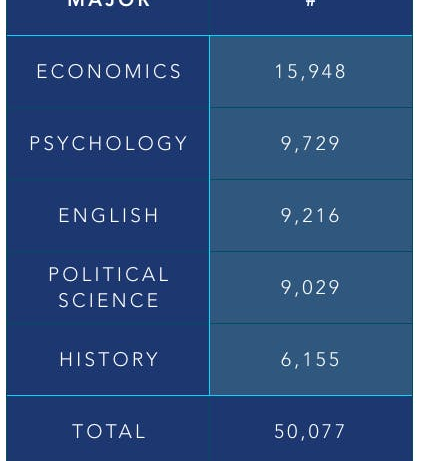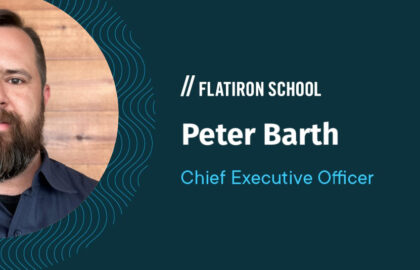Tell me if this sounds familiar: You’re passionate about all things tech. You’re always the first of your friends to find out about the newest app. You spend way too much money on the latest gadget.
And you’d love to work at a cool tech company.
So why aren’t you?
If you’re anything like me, you’ve got a lot of reasons.
See, even though I grew up a total nerd (I was hanging out on Prodigy and Compuserve before the Internet was even, well, the Internet), it was eight years after college before I got my first tech job. And that’s because of three assumptions I had about the tech world – each one, dead wrong, it turned out.
Assumption 1: Tech Is for Tech Majors
As an education and political science major, I assumed my destiny was to do… umm… education and political science. So I became a kindergarten teacher after graduation and went on to work for a variety of education-focused nonprofits.
And even though I longed to work in tech, I figured that arena was solely the birthright of my classmates who had majored in more technical fields – computer science, engineering, etc.
But years later, after starting my first tech job at Apple, I was stunned to find that my colleagues hailed from all sorts of backgrounds. There were finance majors, cognitive science specialists, dancers, and former architects. And yes, there were CS majors and engineers, but they were actually the minority, believe it or not.
In fact, at last glance on LinkedIn, there were over 50,000 liberal arts grads working in the US tech sector – and that just counts five fields:

Bottom Line: Your formal education isn’t destiny. It’s a starting point, not a finish line.
Assumption 2: Tech Is Time-Limited
When I asked my friends from undergrad why they wanted to go into consulting or banking, they often said: “Because this is my only chance!” In other words, due to the systematic way that those fields hire and train new recruits, there are really only a handful of entry points – right after undergrad and right after business school.
Given my naiveté about the world of work, I assumed that this model would be similar for most other large companies. Including, of course, Google, Microsoft, and all the other tech giants I admired. Which meant that, having missed out on the post-undergrad entry point, I figured I was basically out of luck.
But again, my perceptions were skewered by reality when I finally did get into tech. Because not only had my colleagues come from all sorts of academic backgrounds, they had also come at various points throughout their careers. Just take a look at a few of the previous employers of current Apple staffers:

Bottom Line: Tech isn’t time-limited to a few entry points. So it’s never too late to break in.
Assumption 3: Old Dogs Can’t Learn New Tricks
Even though I had fond memories of figuring out the arcane syntax of DOS as a kid, by the time I started my career, I figured those days of eager learning were behind me. Especially since the handful of programming classes I took in high school and college left me so uninspired: “Ugh, how did my passion become my pain???”
That is, until, five years into my career, I came across an interesting challenge at the small nonprofit I was working for. The website we used to collect grant applications was starting to fall apart since it had been built on a shoestring budget. And we didn’t have the resources to get it professionally repaired. So I decided to try my hand at fixing it myself, learning just enough PHP and MySQL in order to get the job done. And even though it probably took me five times as long as it would have taken a pro, the thrill of doing it myself was easily one of the highlights of my career up until that point.
All of which taught me an important lesson: Tech skills, like most important talents, aren’t easily learned in a vacuum. Just like you learn public speaking by having to give speeches (not by merely watching others give them), learning to code is best done in the context of a problem to be solved. And that’s why the real project-based approach used by Flatiron School is so much more powerful than just sitting in a computer science lecture hall.
Bottom Line: Tech skills can be acquired later in life. But you need effective motivation, not just instruction.
It’s Time to Ditch Those Assumptions
In spite of all this psychological baggage that blocked my entrance to tech, I finally did make it to the promised land. So my only regret is that it took so long. That I let my assumptions cloud my decision-making instead of seeing them for what they are – mere assumptions, not facts.
And so my greatest hope is that you’ll ditch them way sooner than I did. That you’ll see past these illusions to the key truths of this world:
-
That tech careers aren’t bound by a major you chose years ago
-
That there’s no better time to break into tech than the present
-
And that you really can teach an old dog new tech tricks
Because if you can internalize those truths sooner rather than later, you’ll be on your way to the most important realization of all: That no matter your background, if you’re passionate about tech, you absolutely belong here.

Jeremy Schifeling is the Founder and Chief Nerd of Break into Tech, an online community for anyone looking to launch a tech career. Previously, he served as an executive at a VC-backed startup and worked at Apple and LinkedIn. Flatiron School readers can get a free, step-by-step course to landing a tech job right here.




